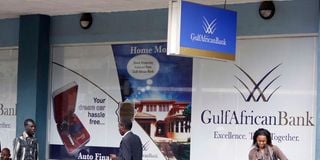Court allows Gulf African Bank to auction property over Sh394 million debt

Gulf African Bank on Kenyatta Avenue in Nairobi August 17, 2011
Gulf African Bank has been allowed to auction a prime property in Nairobi belonging to a private company facing liquidation, to recover Sh394 million.
This is after the High Court lifted an injunction stopping the lender from disposing of the property in Karen despite a petition lodged by Elite Intelligent Traffic Systems Limited seeking orders for its liquidation.
In the petition urging the court to make an order for its liquidation, Elite Intelligent Systems stated that it was insolvent and was unable to pay its debts.
Apart from the property to be auctioned, Justice Josephine Mong'are offered Elite Intelligent Systems a temporary relief by suspending all proceedings, executions of judgment and decrees against the company by the unsecured creditors pending the hearing and determination of the case.
While allowing the lender to auction the property, the judge said an order staying proceedings did not apply to a bank exercising its power of sale in respect of the secured property.
The judge argued that the intention of granting a stay order was to ensure equality among the unsecured creditors in line with the objects of insolvency law that creditors ought to be treated equally.
"I am therefore inclined to stay any and all legal proceedings, actions against the Elite Intelligent Systems or executions of judgments, orders, decrees by unsecured creditors until the petition is heard and determined," ruled Justice Mong’are.
Liquidation
Elite Intelligent Systems moved to court early this year and petitioned the court to make an order for its liquidation claiming it was facing liquidate challenges and could not pay its various debts. It urged the court to order its insolvency.
After lodging the insolvency petition, the firm sought another order blocking the forced sale of its property L.R No.1160/339 Kwarara Road, Karen estate.
The firm's director Mr Patrick Mwangi Kibaiya said in an affidavit sworn on March 25, 2024, that the intended sale would greatly prejudice the insolvency proceedings and particularly its unsecured creditors whose interests would best be served through realising and consolidating the assets it owns as well as the debts.
According to Mr Kibaiya, the firm was willing to offer a payment plan or arrangement to the satisfaction of the creditors but stated it was currently undergoing financial challenges and lacked the capacity to pay its debts.
That if afforded reprieve, pleaded Mr Kibaiya, the firm could settle all its outstanding debts as it stood to suffer irreparably if the prayers sought in the petition were not granted.
Unsecured creditors
Mr Kibaiya informed the court that Gulf African Bank still had the option to either relinquish or maintain the security over the suit property as the insolvency proceedings continued and that the issuance of the order of injunction would not prejudice the lender.
Gulf African Bank opposed the case arguing that Elite Intelligent Systems “cannot complain on behalf of the unsecured creditors as it purports to do.”
The bank maintained that the rights of unsecured creditors were subordinate to its rights as a secured lender and that in any event, liquidation cannot stop the enforcement of a security held by a secured creditor.
The court heard that the company failed to disclose that the Karen property had been the focal point of numerous court decisions and that the rulings followed the firm's prolonged endeavour to obstruct its right to sell the property over a span of four years.
Gulf African Bank revealed that all court decisions had unequivocally affirmed its right to sell the suit property.
The lender further informed the court that the value of the security provided had been surpassed by the accumulated and outstanding amounts, “with a genuine risk of this disparity worsening further over time.”
The bank said the outstanding debt stood at Sh393.9 million against a forced sale value of Sh146.3 million.





